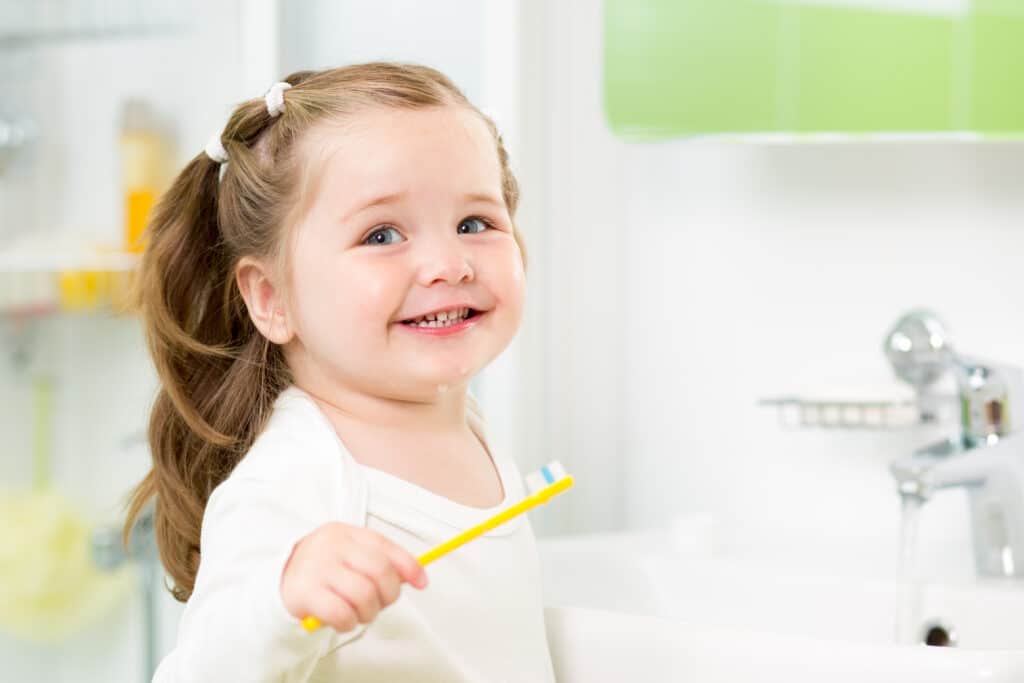Babies and children go through cycles of teething and losing their baby teeth to make room for their permanent adult teeth. Children can start to lose baby teeth from the age of 4-7 years old. Each child is different and will get teeth and lose teeth at different times and visiting the dentist regularly will help you ensure that everything is healthy and normal.
Losing Baby Teeth
Most children are excited about losing their first tooth, but as a parent, you may not know how to proceed when your child loses a tooth or is worried about losing their teeth. Here are some tips from our dental office and pediatric specialists to help best prepare your children for when they begin to lose their baby teeth.
1- Dispel Fears Of Pain
Some children worry about the pain that could come from losing teeth. When a baby tooth is ready to come out, it should naturally fall out on its own and shouldn’t be painful. If a child pulls out a tooth too soon or is knocked out, it can cause some pain. When a child is afraid to pull their own teeth or scared about the pain it could cause, you can apply a topical anesthetic to help numb some of the pain, or consult your dentist about the best way to proceed.
Pulling teeth and putting them under their pillow for the tooth fairy can be fun for children. This can help them overcome the fear of missing teeth or the pain that comes with pulling teeth.
2- Don’t Pull Out A Loose Tooth Unless It Is Ready

Your child will lose baby teeth at the appropriate time and teeth can loosen for other reasons besides making way for adult teeth. Just because baby teeth are loose, doesn’t mean they are quite ready to leave your child’s mouth. Using floss and slamming the door or jostling the teeth too much can actually cause pain in your child’s gums or cause excessive bleeding. If bleeding or unbearable pain comes after pulling a baby tooth, contact your dentist.
3- Make Oral Health A Habit Now
When new adult teeth start to come in, it is important to tell your kids to focus on their oral health because the new teeth are ones they will have forever. After losing baby teeth proper brushing and flossing are still important to prevent infections or cavities.
Right after losing a tooth, your child will want to avoid scrubbing or flossing the sensitive area for a few days. But you should not neglect your other teeth just because there is a gap. Showing a routine of brushing, flossing, rinsing, using fluoride, and scheduling regular checkups at the dentist now can help your children protect their adult teeth through their teen and adult years.
4- Pieces Of Tissue Left Behind
After losing baby teeth, some children will have a flap of tissue left behind. It is important to leave healthy tissue alone and not rip or pull this tissue away from your child’s gums. Removing this tissue can be painful and is just unnecessary. The tissue will often just fall off or wear down on its own. If it is bothersome to your child, you can take them to the dentist and consult the dentist for help.
5- Gaps Are Normal When Losing Baby Teeth
Missing teeth can be a source of self-consciousness and can affect children’s speech for a temporary time. Some children really struggle when they have gaps in their teeth and may even be bullied. Losing teeth is normal and each child will have to go through it. Helping children understand that each child will lose teeth at different times and gaps in their teeth are only temporary can help ease the transition to adult teeth.
6- Have Topical Anesthetics And Anti-Inflammatory On Hand
Some children are very sensitive to pain and may want some help before losing teeth to manage their anxiety around pain. Having a topical anesthetic can relieve some initial pain that comes after a tooth has fallen out and is a fast and easy way to relieve this. If a loose tooth is bothering them or hurts to wiggle, ibuprofen or Tylenol can help relieve some discomfort.
After a tooth has been removed, your child may have a swollen socket from wiggling beforehand. Anti-inflammatories can help reduce swelling, but if it persists contact your dentist.
Our Pediatric Dentists At Eric Felt D.D.S.
Dr. Eric Felt has been practicing for over 31 years and has helped patients of all ages. Whether it is advice about baby teeth, filling cavities, or improving your bite, our team can help give you and your family better smiles.
Our dental office in Cottonwood Heights is airy, light, and friendly to help patients feel safe and comfortable. With the stunning Utah scenery outside our office and our soothing environment inside our office, we hope this will help your dental experience be more pleasant. Dr. Eric Felt works hard to do what is right for his patients. Our team wants to help you improve your oral health and enjoy your daily activities.


